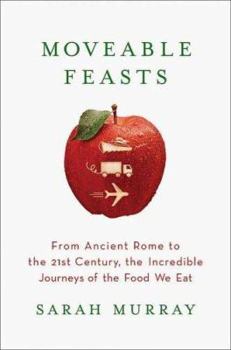Moveable Feasts: From Ancient Rome to the 21st Century, the Incredible Journeys of the Food We Eat
Select Format
Select Condition 
Book Overview
Today the things we eat and drink have crossed oceans, continents, and even airspace before reaching the dinner table. The complex systems and technologies devised throughout the centuries to deliver... This description may be from another edition of this product.
Format:Hardcover
Language:English
ISBN:0312355351
ISBN13:9780312355357
Release Date:November 2007
Publisher:St. Martin's Press
Length:256 Pages
Weight:0.05 lbs.
Dimensions:0.9" x 6.4" x 9.5"
Customer Reviews
5 ratings
Fun and informative.
Published by Thriftbooks.com User , 15 years ago
This is an enjoyable book that combines concrete information and statistics, history, and very interesting anecdotes about what lands on the dinner table. The voyages and cultural context of meals past and present are discussed in a well-written work that is fun to read. Most readers will probably have an "I never knew that!" experience while reading. For those of us that love to read, what could be better?
An enjoyable and fascinating read
Published by Thriftbooks.com User , 16 years ago
"Food transport" sounds like a prosaic topic for a book but this work is the product of an intellectually curious mind. Sarah Murray has gone to great lengths to bring readers this entertaining and highly informative read; eating fermented mare's milk in Mongolia, squeezing into crowded train compartments with the Tiffin Wallas of India, and joining a flight crew for an emergency food drop from a UN World Food Transport plane. My favorite chapter was the author's fascinating retelling of the Berlin Airlift. A topic that most of us learned at school is brought new life and energy by the author's in-depth interviews with the pilots who brought off this logistically flawless operation. For anybody interested in history, economics, and how capitalism both solves and creates problems, I recommend, "Moveable Feasts." If you liked Tom Friedman's "The World Is Flat," you'll love this book.
History made fun
Published by Thriftbooks.com User , 16 years ago
Just bought this book last week, and I couldn't put it down. As a history buff, I really enjoyed discovering how much of an impact the food trade has had on the world we live in. Through many lively stories, the author takes you all over the world. I particularly liked the chapter on the Berlin airlift, I had never realized how much what was essentially a humanitarian mission to feed people in West Berlin ended up having such a political significance. There are many other amazing stories in this book, and we should all realize, in the end, all that really matters it what we eat!
A feast of a book
Published by Thriftbooks.com User , 16 years ago
With a disarming combination of humor, insight and expertise, Sarah Murray tells a wonderful story -- or rather, a bunch of stories - of how food moves. Studded with fascinating examples, she ranges effortlessly from ancient Rome to modern Bombay to show how the movement of food has shaped history, as well as our own times. To be honest, this is not a question I had considered before; since reading this book, though, I find myself looking at the grocery shelves with new appreciation. Moreover, Murray makes a real contribution to the debate over "food miles," arguing persuasively it makes much more sense to look at the life cycle of food production, rather than just how many miles an item has traveled, when judging its environmental impact. Highly recommended: Foodies, of course, will love it, but so should anyone interested in history and the environment.
A culinary adventure
Published by Thriftbooks.com User , 16 years ago
Grapes eaten in Iowa may have been on a complicated voyage from Chile. The French beans we consume come from Kenya, flown thousands of miles in refrigerated containers to London. In Beijing or Shanghai people now enjoy Italian olive oil and Japanese noodles, Belgian chocolates and French cheese. The author shows that most of what we consume travels thousands of miles from its origins to the dinner table. Shipping food across the world has challenged the ingenuity and technical expertise of engineers and inventors of the earliest times. Today, fish is frozen and sent on a ship to China where it is defrosted and filleted before being refrozen and sent back to America or Europe. These are the sort of voyages this book describes. It shows that the movement of food, often over vast distances, has for centuries been part of human life. It also shows the complex tradeoffs that emerge as we try to ensure that our food supply, which relies heavily on fossil fuels, is sustainable. The book is very well documented and readers will realise that the things we eat and drink are eminently moveable.




